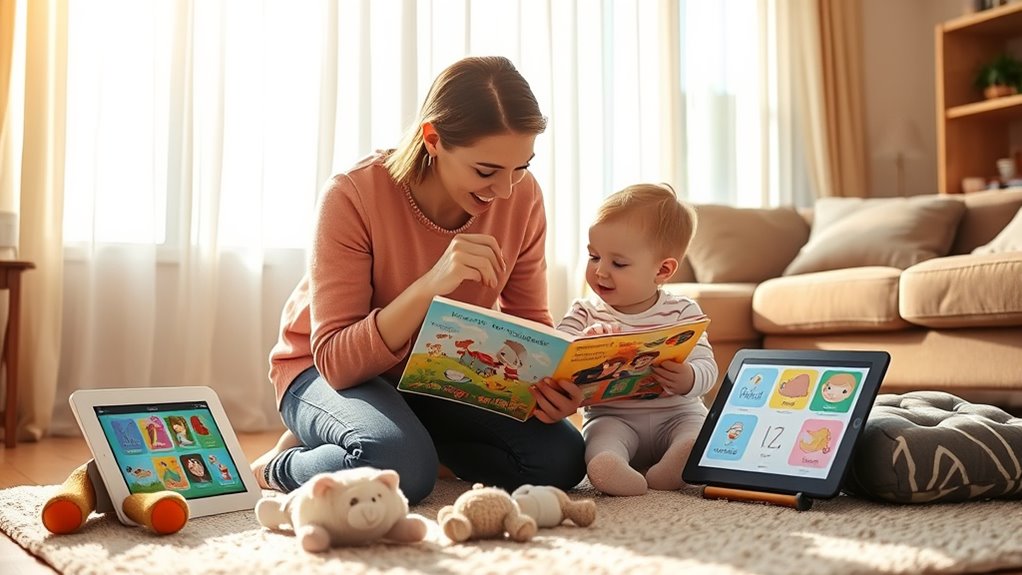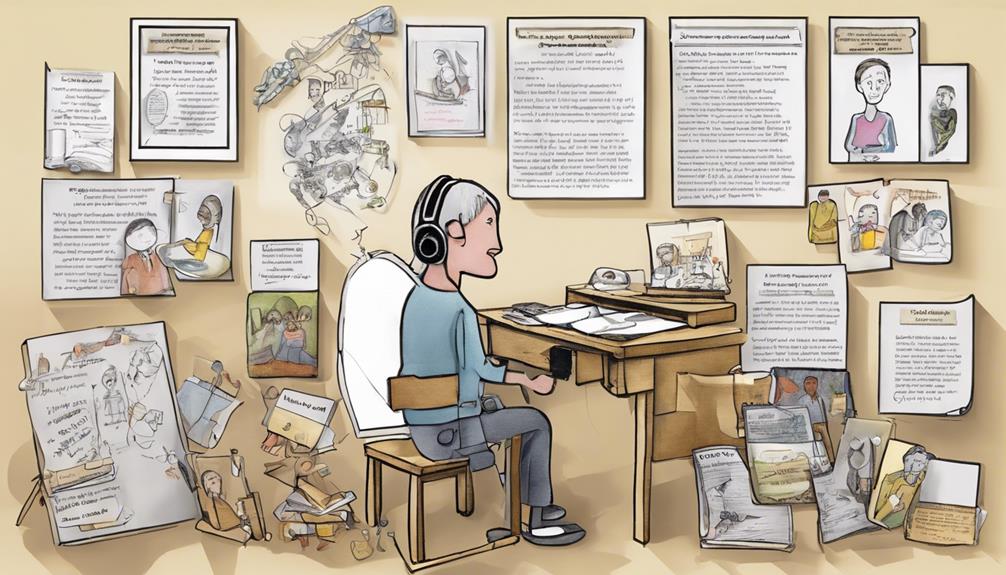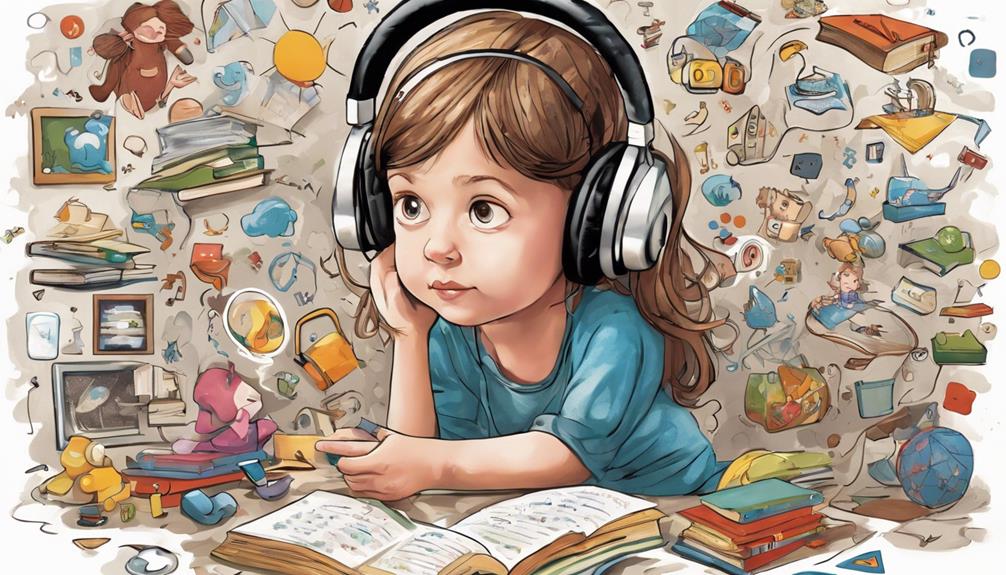To support your child’s speech at home, make certain they wear their hearing devices as recommended and maintain their proper functioning. Engage in everyday conversations by speaking clearly, using expressive tones, and narrating daily activities. Create a rich auditory environment through music, reading aloud, and sound games. Incorporate listening routines into routines like mealtime or car rides, and celebrate small successes to build confidence. Keep exploring these strategies to discover more ways to boost your child’s language development.
Key Takeaways
- Use clear, natural speech with expressive tone and facial cues to enhance understanding during everyday conversations.
- Implement consistent listening routines by describing surroundings and activities to reinforce language in context.
- Incorporate singing, reading aloud, and sound awareness activities to develop auditory discrimination skills.
- Regularly check and optimize hearing devices to ensure continuous auditory input and device functionality.
- Offer positive reinforcement, celebrate progress, and maintain patience to build confidence and encourage active participation.

Auditory-Verbal Therapy (AVT) is a specialized approach that helps children with hearing loss develop spoken language skills through active listening. As a parent, your involvement plays a crucial role in supporting your child’s speech development outside of therapy sessions. You can create an environment that encourages listening and language growth by integrating simple, consistent practices into your daily routine. Start by ensuring your child wears their hearing devices as recommended and check them regularly to maximize auditory input. When your child’s hearing aids or cochlear implants are functioning properly, they can better access sounds that are essential for speech development.
Engaging your child in everyday conversations is one of the most effective ways to foster language skills. Speak clearly, at a natural pace, and use expressive tone and facial cues to help your child interpret meaning. Narrate what you’re doing throughout the day—whether you’re cooking, cleaning, or playing—to provide continuous language models. Repetition is key; repeating words and phrases helps reinforce understanding and pronunciation. Also, pause occasionally to give your child time to respond, encouraging their active participation in the conversation. This back-and-forth interaction strengthens listening skills and builds confidence in their speaking abilities.
Engage your child daily with clear speech, narration, repetition, and pauses to build confidence and listening skills.
Another essential aspect is creating a rich auditory environment. Play music, sing songs, and read aloud together. These activities expose your child to a variety of sounds and vocabulary, making speech more meaningful and enjoyable. When you read books, emphasize words and use expressive voice to highlight important sounds and syllables. Asking questions about the story or pictures encourages your child to listen carefully and participate verbally. Remember, your enthusiasm and involvement motivate your child to stay engaged and enthusiastic to communicate. Incorporating sound awareness activities like listening to different tones and pitches can further enhance their auditory discrimination skills.
Incorporate routines that promote listening, such as during meal times or car rides, where you can describe surroundings or upcoming activities. Consistent use of language during these moments helps your child associate words with real-life experiences. Be patient and attentive; celebrate small successes and provide positive reinforcement to boost their confidence. Your active participation not only supports their speech development but also builds a trusting bond that encourages your child to communicate more freely.
Ultimately, your ongoing involvement in everyday activities profoundly impacts your child’s progress in speech development. By maintaining a listening-rich environment, engaging in meaningful conversations, and consistently supporting their auditory learning, you help your child make the most of AVT techniques at home. Your dedication and active participation are powerful tools in helping your child develop clear, confident spoken language skills.
Frequently Asked Questions
How Early Can Parents Start Using Auditory-Verbal Techniques at Home?
You can start auditory-verbal techniques at home as early as your child’s first months. Early intervention is crucial because it supports your child’s language development from the start. Your active parental involvement plays a vital role in reinforcing these skills daily. By engaging in simple, consistent activities like talking, singing, and listening exercises, you help your child build strong auditory and speech foundations, setting the stage for successful communication skills.
What Common Challenges Do Parents Face When Implementing These Techniques?
You might face consistency challenges when implementing auditory-verbal techniques at home, making it hard to maintain regular practice. Emotional hurdles, like frustration or feeling overwhelmed, can also arise as you try to support your child’s hearing development. These obstacles are common, but staying patient and establishing a routine can help. Remember, progress takes time, and your dedication makes a significant difference in your child’s growth.
How Can Parents Measure Their Child’s Progress With Auditory-Verbal Therapy?
You can measure your child’s progress with auditory-verbal therapy by focusing on progress tracking and milestone assessment. Keep a detailed journal of their responses to sounds, words, and sentences over time. Watch for key milestones like improved speech clarity or increased responsiveness. Regularly review these observations to see patterns of growth. This helps you understand how well your child is developing auditory and speech skills, guiding your ongoing support efforts.
Are There Specific Activities to Encourage Listening Skills Daily?
You can encourage listening skills daily through simple activities like interactive play and integrating listening into daily routines. During play, narrate actions and describe sounds to enhance awareness. In everyday routines, ask your child to listen for specific sounds, like the doorbell or a phone ring, and respond accordingly. These activities make listening fun and natural, helping your child develop stronger auditory skills every day.
How Do I Coordinate Therapy Techniques With Professionals’ Advice?
Think of your child’s progress as a team effort, where every player works together seamlessly. To coordinate therapy techniques with professionals’ advice, stay actively involved in professional collaboration, ask questions, and share observations regularly. This helps guarantee therapy integration into daily routines. You’re the captain guiding the process, so keeping open communication and following expert guidance maximizes your child’s development and creates a unified approach to support their hearing journey.
Conclusion
By embracing these auditory-verbal therapy techniques at home, you’ll build a bond that bolsters your child’s speech and sound skills. Consistent communication, clever cues, and caring consistency create a confident, capable communicator. Remember, patience and practice pave the path to progress. With love, listening, and lively learning, you’ll see your child’s skills soar, shaping a sound future full of success and self-assurance. Keep nurturing, and watch your child’s confidence continuously conquer challenges.










